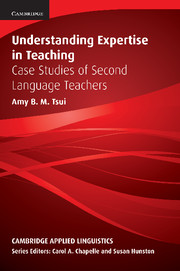Book contents
- Frontmatter
- Contents
- Series Editors' Preface
- Acknowledgments
- Chapter 1 Introduction
- Chapter 2 Conceptions of Expertise
- Chapter 3 Characteristics of Expert and Novice Teachers
- Chapter 4 Teacher Knowledge
- Chapter 5 The Case Studies
- Chapter 6 The Professional Development of the ESL Teachers
- Chapter 7 Teacher Knowledge and Managing the Classroom for ESL Learning
- Chapter 8 Teacher Knowledge and the Enactment of the ESL Curriculum
- Chapter 9 Taking on the Challenge: Exploring Process Writing
- Chapter 10 Understanding Expertise in Teaching
- Appendix 1 Reader's Comment Form on First Draft for the Second Writing Task (Angel's First Draft)
- Appendix 2 Learner Training in Making Revisions
- References
- Index
Chapter 7 - Teacher Knowledge and Managing the Classroom for ESL Learning
Published online by Cambridge University Press: 05 October 2012
- Frontmatter
- Contents
- Series Editors' Preface
- Acknowledgments
- Chapter 1 Introduction
- Chapter 2 Conceptions of Expertise
- Chapter 3 Characteristics of Expert and Novice Teachers
- Chapter 4 Teacher Knowledge
- Chapter 5 The Case Studies
- Chapter 6 The Professional Development of the ESL Teachers
- Chapter 7 Teacher Knowledge and Managing the Classroom for ESL Learning
- Chapter 8 Teacher Knowledge and the Enactment of the ESL Curriculum
- Chapter 9 Taking on the Challenge: Exploring Process Writing
- Chapter 10 Understanding Expertise in Teaching
- Appendix 1 Reader's Comment Form on First Draft for the Second Writing Task (Angel's First Draft)
- Appendix 2 Learner Training in Making Revisions
- References
- Index
Summary
In this chapter I shall examine the classroom practices of the four ESL teachers and the knowledge embedded in these practices. The investigation of classroom practices will be done under two broad areas: the management of the classroom for learning, and the enactment of the ESL curriculum. The latter refers to the way the ESL curriculum is being given meaning by the teacher and the students (see Synder, Bolin, and Zumwait, 1992). As pointed out in Chapter 4, these two broad areas are intermeshed and often difficult to disentangle. Their division is more for the convenience of organizing the discussion than real. In this chapter I shall focus on the management of the classroom for learning, or “the management of learning.” The enactment of the English curriculum will be the concern of the next chapter.
ESL Teacher Knowledge
While there are a number of studies on the knowledge of L1 English teachers (see, for example, Grossman, 1990; Hillocks, 1999), not much has been written about ESL teacher knowledge (see, however, Woods, 1996; Tsui and Nicholson, 1999). In ESL teaching, the target language is both the medium and the object of learning. While there seems to be a consensus that the ESL teacher's ability in the target language is part of teacher knowledge, it is not evident that there is consensus regarding what constitutes the subject matter knowledge of ESL teachers and whether such knowledge should be explicitly taught.
- Type
- Chapter
- Information
- Understanding Expertise in TeachingCase Studies of Second Language Teachers, pp. 136 - 176Publisher: Cambridge University PressPrint publication year: 2003

